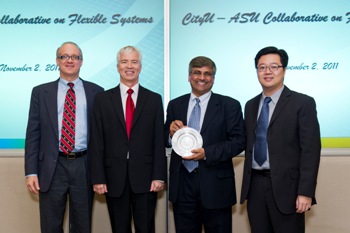Arizona State University (ASU) and City University of Hong Kong (CityU) have entered into a partnership for the advancement of flexible electronics systems.
 Representatives from ASU and City University of Hong Kong met on Nov. 2 to formalize a collaboration on flexible electronics. From left to right: David Allee, Gregory Raupp, Sethuraman "Panch" Panchanathan, and Johnny Ho.
Representatives from ASU and City University of Hong Kong met on Nov. 2 to formalize a collaboration on flexible electronics. From left to right: David Allee, Gregory Raupp, Sethuraman "Panch" Panchanathan, and Johnny Ho.
ASU develops flexible electronics at its Flexible Display Center (FDC), which was established in 2004 through a partnership deal with the United States Army Research Laboratory for the commercialization of lightweight, rugged, low-power and flexible electronics and display technologies.
According to the deal, ASU delivers innovative pilot line production capability and expertise in flexible microelectronics using advanced amorphous silicon thin film transistor (TFT) technology and advanced metal oxide TFT technology.
CityU provides its expertise in TFT technology, which is fast-evolving and promises high-performance called flexible nanowires. The utilization of nanowire TFTs on a production scale paves the way to several innovative flexible electronic applications. For instance, soldiers can access mission briefs, real-time maps and other data on screen stitched onto their uniforms. These flexible displays can enhance technologies from conferencing systems to e-readers.
In this partnership, ASU will be led by David Allee, who serves as FDC’s Director of Research for Backplane Electronics and CityU will be led by Gregory Raupp, who serves as CityU’s Vice President of Research and Technology and is the founder of the FDC. Edwin Pun, CityU’s Chair Professor of Electronic Engineering, and Johnny Ho, CityU’s Assistant Professor of Materials Science will provide technical leadership.